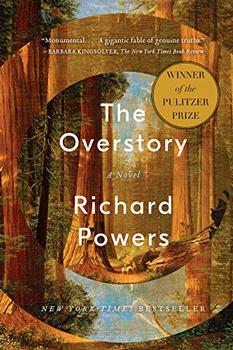Summary | Excerpt | Reading Guide | Discuss | Reviews | Beyond the Book | Readalikes | Genres & Themes | Author Bio

A Novel
by Richard Powers
That night, drunk on roasted chestnuts, Hoel proposes to Vi Powys, an Irish girl from the pine-framed row houses two blocks from his tenement, on the edge of Finn Town. No one within three thousand miles has the right to object. They marry before Christmas. By February, they are Americans. In the spring, the chestnuts bloom again, long, shaggy catkins waving in the wind like whitecaps on the glaucous Hudson.
Citizenship comes with a hunger for the uncut world. The couple assemble their movable goods and make the overland trip through the great tracts of eastern white pine, into the dark beech forests of Ohio, across the midwestern oak breaks, and out to the settlement near Fort Des Moines in the new state of Iowa, where the authorities give away land platted yesterday to anyone who will farm it. Their nearest neighbors are two miles away. They plow and plant four dozen acres that first year. Corn, potatoes, and beans. The work is brutal, but theirs. Better than building ships for any country's navy.
Then comes the prairie winter. The cold tests their will to live. Nights in the gap-riddled cabin zero their blood. They must crack the ice in the water basin every morning just to splash their faces. But they are young, free, and driven—the sole backers of their own existence. Winter doesn't kill them. Not yet. The blackest despair at the heart of them gets pressed to diamond.
When it's time to plant again, Vi is pregnant. Hoel puts his ear to her belly. She laughs at his awe-slapped face. "What is it saying?"
He answers in his blunt, thumping English. "Feed me!"
That May, Hoel discovers six chestnuts stuffed in the pocket of the smock he wore on the day he proposed to his wife. He presses them into the earth of western Iowa, on the treeless prairie around the cabin. The farm is hundreds of miles from the chestnut's native range, a thousand from the chestnut feasts of Prospect Hill. Each month, those green forests of the East grow harder for Hoel to remember.
But this is America, where men and trees take the most surprising outings. Hoel plants, waters, and thinks: One day, my children will shake the trunks and eat for free.
...
THEIR FIRSTBORN DIES in infancy, killed by a thing that doesn't yet have a name. There are no microbes, yet. God is the lone taker of children, snatching even placeholder souls from one world to the other, according to obscure timetables.
One of the six chestnuts fails to sprout. But Jørgen Hoel keeps the surviving seedlings alive. Life is a battle between the Maker and His creation. Hoel grows expert at the fight. Keeping his trees going is trivial, compared to the other wars he must wage each day. At the end of the first season, his fields are full and the best of his seedlings stands over two feet tall.
In four more years, the Hoels have three children and the hint of a chestnut grove. The sprigs come up spindly, their brown stems lined with lenticels. The lush, scalloped, saw-toothed, spiny leaves dwarf the twigs they bud from. Aside from these starts and a few scattered bur oaks in the bottomlands, the homestead is an island in a grassy sea.
Even the skinny starts already have their uses:
Tea from infant trees for heart trouble, leaves from young sprouts to cure sores, cold bark brew to stop bleeding after birth, warmed galls to pare back an infant's navel, leaves boiled with brown sugar for coughs, poultices for burns, leaves to stuff a talking mattress, an extract for despair, when anguish is too much... .
The years unfold both fat and lean. Though their average tends toward runty, Jørgen detects an upward trend. Every year that he plows, he breaks more land. And the future Hoel labor pool keeps growing. Vi sees to that.
The trees thicken like enchanted things. Chestnut is quick: By the time an ash has made a baseball bat, a chestnut has made a dresser. Bend over to look at a sapling, and it'll put your eye out. Fissures in their bark swirl like barber poles as the trunks twist upward. In the wind the branches flicker between dark and paler green. The globes of leaves sweep out, seeking ever more sun. They wave in the humid August, the way Hoel's wife will still sometimes shake free her once-amber hair. By the time war comes again to the infant country, the five trunks have surpassed the one who planted them.
Excerpted from The Overstoryby Richard Powers. Copyright © 2018 by Richard Powers. With permission of the publisher, W. W. Norton & Company, Inc. All rights reserved.
Your guide toexceptional books
BookBrowse seeks out and recommends the best in contemporary fiction and nonfiction—books that not only engage and entertain but also deepen our understanding of ourselves and the world around us.